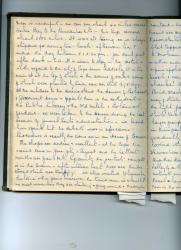
Manuscript journal of a South African lady, 1948, returning after many years in England, including an account of her memories 'of the Cape as a girl'.
4to, 166 pp. In ruled 'University Exercise Book'. Text clear and complete. On lightly aged paper, tight, in shaky binding with worn boards. The identity of the diarist is unclear. Her husband is named 'Berten', and their are references to 'Minie' (daughter?) and 'Kate' (South African sister-in-law?). A loosely air mail letter may provide a clue to the identity of the diary's author. Dated 30 April 1962, it is written by P. J. Duncan of Newlands to Miss Ruth Ince-Jones (diarist's daughter) of Geneva, Switzerland. Biographical clues are hard to come by: the diarist and her husband were last in the country on a 'wonderful holiday' nine years previously, 'Berten' has a typewriter, and the couple are methodists. Divided into three main sections. The first main section, of 17 pp, sets out, for 'Mrs. Mitchell', 'some of my memories of the Cape as a girl, & thats a long while ago'. Possibly written after the other two main sections, as it would appear to duplicate some of the accounts in them. As throughout the rest of the journal, the memories are universally blissful, but specific details are hard to come by. (For example, 'My next memory is of starlight when I used to feel the stars so near - only to put up my hands to clasp them.') One of her memories is of 'the flower sellers, colored women & an occasional man who brought their flowers to town on Sat. morning were allowed to sell them at the edge of the pavement on the side of Adderly St.' Describes a visit to 'the Zulu Reserve in the Valley of a thousand Hills & saw the Zulus in their natural environment. We went into the subchief Gogodas' Kraal a large round hut & saw his daughters grinding corn in the way they have done for centuries. Gogoda was 65 & was just about to take his 3rd. wife - he had to give 20 head of cattle for her & each one was worth over £10.' The second main section, of 110 pp, is dated at the start from the Bellaire Private Hotel, Fish Hoek, Cape Province, 18 January 1948. Irregularly dated, to at least 2 May. The mood of this and the third section is universally light, contented, and wistful, with descriptions of sightseeing, pleasant pastimes and happy visits to numerous individuals, the whole bringing into focus the privileged life led by the whites of apartheid South Africa. For example, on 15 February, 'B called on Mr. Timberlake, I waited on beach - then on to Dalebrook where I tried to recapture girlish thrills - paddled - could find no shells.' The previous day the diarist writes, in an entry that gives an indication of the volume's tone: 'A week since I wrote this diary. The days are passing so quickly & each has brought its own pleasures. This seems to be a still morning, with beautiful sunshine. Last Sat. B. & J. found Miss Stephen after a long walk & arranged for her to have tea with us when Miriam & Douglas came. We were tired so we went to the Lavender Tearooms & had fruit salad & ice cream. I was fortunate in getting Clydella for Joy. There was a Penguin on the rocks being stroked by a young girl. I bathed in pool and screambled over rocks to see Penguin which had come to this rock - children about 10 & 11 years helped me over the rocks - water was cold. Had rest after lunch & had to hurry for train. Elizabeth gave us pastry for lunch which was very good, pears in jelly icecream peaches - 9.30 train home. S.E blowing wind strong & cold.' Begins 'Well, here we are at last. It seems so long since we left England and it is so difficult to think of rain, the cold & all the shortages & hardships we have left behind. Here the sun is shining - there is a gentle breeze and an abundance of good food.' Entry for 22 January indicates the length of her absence from South Africa: 'Cape Town seemed small to me - did not feel bewildered as I did 12 yrs ago.' Rare and patronising references to non-whites (for example 'Hottentots [...] beautiful with a purple sheen' and 'Zulu huts on sides of hills, ground tilled to fences. Woman does all work & the girls helps her. Father hunts & small boys keep cattle off the crops.'). She visits the Parliament House and hears Smuts speak ('splendid seats in gallery [...] most talk in Africanse'). The third main section, of 34 pp, begins 2 December 1948. Of the railways she writes 'White people travel 1st. class, Cape Colored 2nd. & natives 3rd. & there are separate waiting rooms & toilets on every station for white only & non european only. When we were there any colored or native person could travel 1st. class if prepared to pay the fare, but the law which made that possible has recently been repealed by the new nationalist movement.' In Pretoria, 'The friends we stayed with had a native boy as help & he did all the housework & most of the cooking. He was about 22 & called "Uniform". This man regularly attends a local church but has not yet abandoned all his native superstitions. Whilst we were there his small niece was taken ill & died; he told my friend that someone was responsible for it & that they would get him yet.'


